Recycling Success
The proof of a realistic soultion is in the packaging that the Recyclate Initiative has brought to market hundreds of millions of times. Numerous awards, positive media coverage, consumer trust in products packaged in recycled plastic encourage the partners in the Recyclate Initiative to keep moving in the right direction.
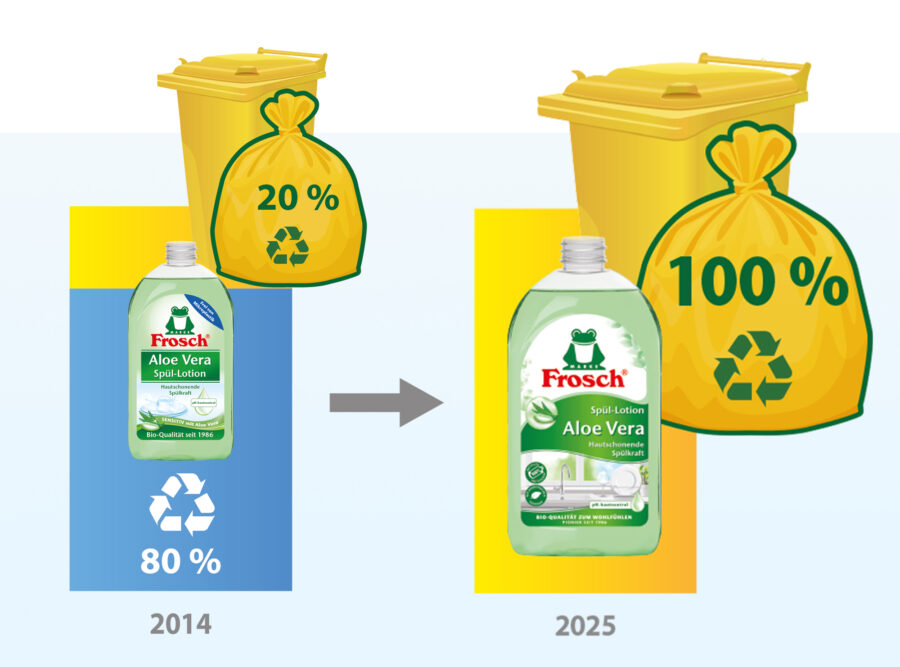
PET Conversion
New Milestone: 100 percent from Yellow Bag
Werner & Mertz, together with its partner ALPLA, has been continuously developing the use of rPET from the Yellow Bag. Since 2014 the PET bottles for Frosch products have been made entirely from recycled material. At first 20 percent of the material came from the Yellow Bag and the remaining 80 percent from the European deposit bottle collection system (Bottle to Bottle). In 2021 Werner & Mertz and ALPLA increased the used plastic share from the Yellow Bag to 50 percent. The next milestone came in 2023 with the increase to 75 percent. Then in summer 2025, Werner & Mertz announced the final milestone—the increase to 100 percent!
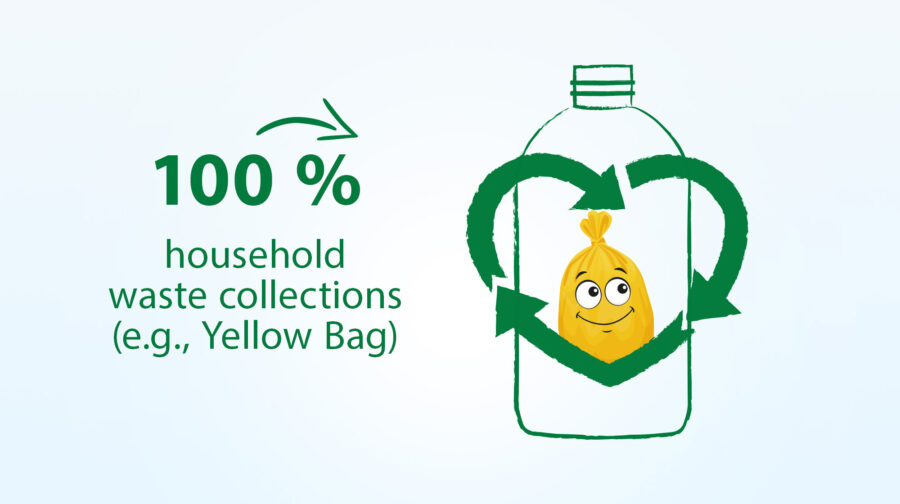
Technological progress and extensive knowledge make innovation possible
Thanks to the familiar high quality and unaltered look of the bottle, consumers do not see a difference. The step up to 100 percent was made possible by a state-of-the-art sorting facility and knowledge acquired from continuous monitoring of the delivered PET bales in the recycling plant.
ALPLArecycling was able to increase sorting efficiency with ultra modern software and computer technology which allow more precise sorting at higher speed. Packaging experts from Werner & Mertz examine the bales of used plastic delivered to the recycling plant. At regular intervals on site, they analyze the materials and their quality in PET bales awaiting recycling. Knowledge of this particular waste stream goes into process development.
That innovation shows that climate-friendly recycling works! Mechanical processing and plastic re-use consume less energy and avoid CO2 emissions.
PE Conversion
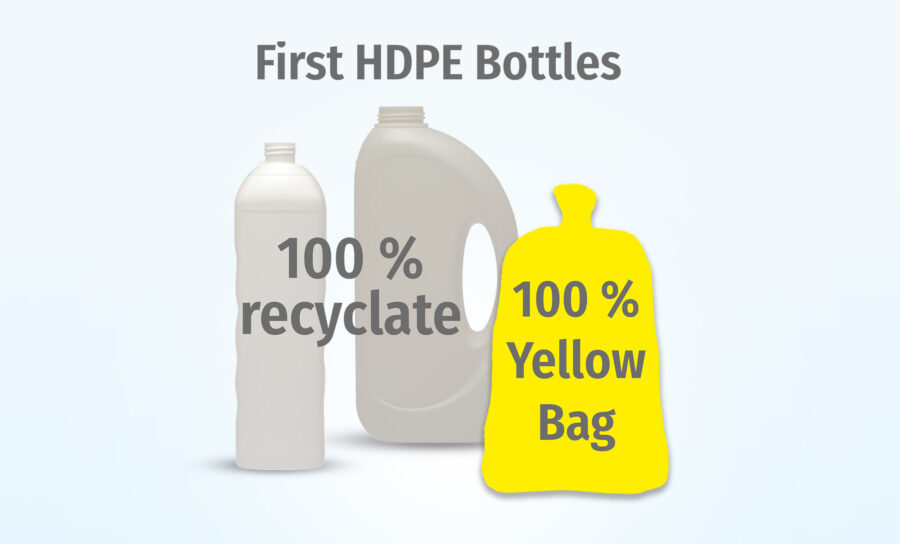
In 2016 the Recyclate Initiative reached another technological milestone when, for the first time, HDPE bottles were made of 100% recyclate—all of which came from the Yellow Bag! The new bottles were used by the floor care brand emsal and the Green Care Professional brand for professional cleaning services.
Up to that point, no translucent and white material had ever been produced from recyclable domestic refuse. Conventional PE recyclates did not have those qualities. The challenge in the development process was identifying the PE among the used plastic in the Yellow Bag that could satisfy the physical and technological specifications for the extrusion blow molding process, and the quality requirements for packaging function and appearance.
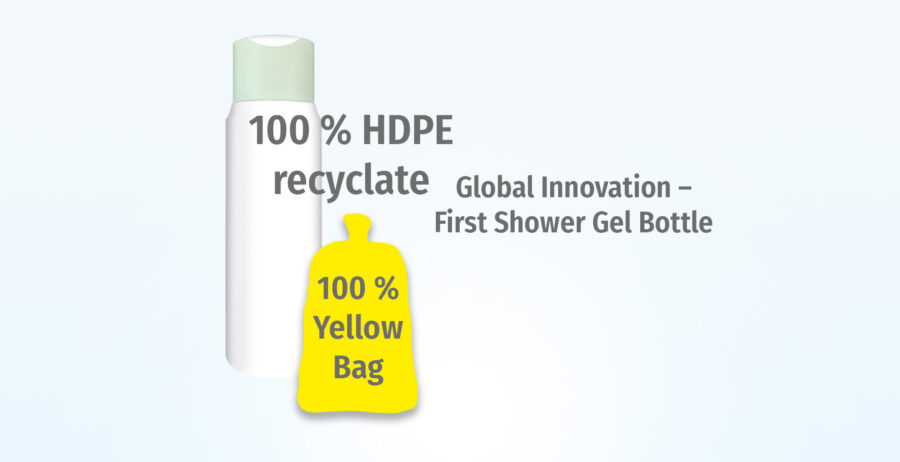
Just three years later, the Recyclate Initiative revolutionized the cosmetics industry. On 1 May 2019, the shower gel bottles for Frosch Senses were made of 100 percent recycled HDPE, the first packaging with HDPE Post Consumer Recyclates (PCR) from the Yellow Bag suitable for use in the cosmetics field. That global innovation was made possible by a special treatment process for HDPE that Werner & Mertz developed in a joint project with The Green Dot and the EREMA Group.
PP Conversion
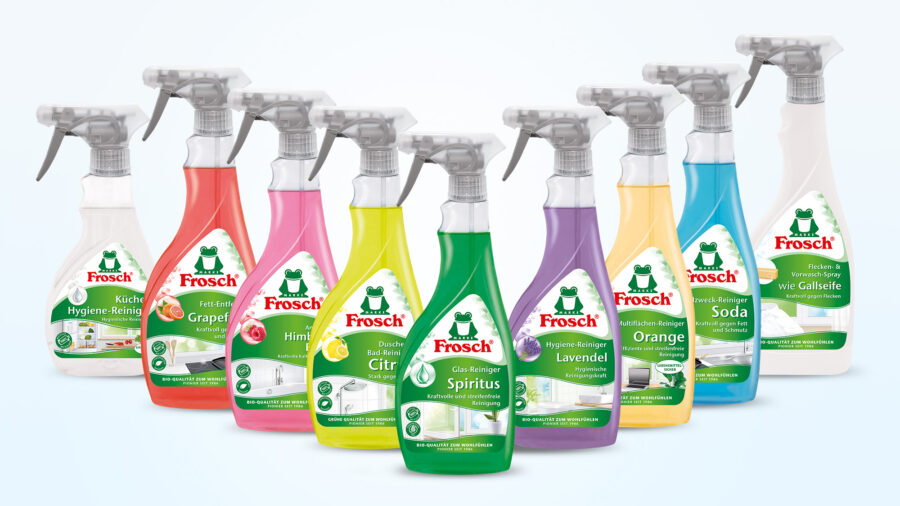
New Recycling Standard: First Trigger Spray Head for the Circular Economy
In collaboration with Berry Global, the Mainz manufacturer of laundry detergents and cleaning products succeeded in making its packaging even more sustainable. The jointly developed trigger spray head is incredibly lightweight, completely recyclable, and, for the first time, is equippd with mechanical components of post-consumer recyclate. All these qualities make it a true record holder in sustainability.
“The goal of our joint project was to implement, consistently and uncompromisingly, all elements of an effective and recyclable spray and foam pump for cleaning products. And that’s exactly what we’ve done!” , says Alexander Schau, Head of Packaging Development at Werner & Mertz.
Several challenges mastered all at once
During development, the two cooperation partners overcame several technical hurdles. The technical properties of PP recyclates, specially adapted for the injection molding process, differ from those of virgin plastic. The challenge was in redesigning the production system to handle the significantly softer recyclates so that the same optimum gliding properties of pistons and cylinders would be possible with PP as with other types of plastic.
Together the two companies managed to create a highly durable spray head that uses as little material as possible containing the maximum amount of recyclate. The modular construction of the system with different nozzle options ensures convenient spraying and foaming of the cleaning product.
Plastic Films Implementation
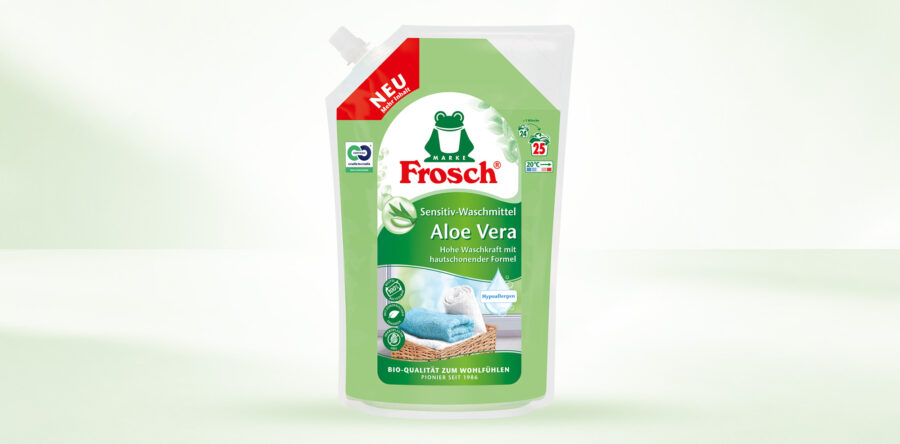
Patented Stand-up Pouch: The Ecological All-Rounder
In 2019 Werner & Mertz and Mondi presented the result of their four-year-old joint project, the world’s first completely recyclable pouch of a monomaterial (polyethylene) with a removable wrap-around label produced in conformance with the Cradle to Cradle® principles. With the patented pouch concept, the partners solved the problem of recycling printed plastic. About 85 percent of all the packaging material is not printed and therefore can be recycled without any loss of quality. Because the remaining 15 percent, the printed label, is free of adhesives and bonding agents, it too can flow back into new uses.
Pouch Concept Revolutionizes the Recycling Industry
The design objective was to use “reverse engineering,” starting from the end of the product life cycle, and create packaging fit for every stage of the recycling process. With the involvement of all stakeholders along the entire supply chain, it was possible to design packaging perfectly suited to recycling and the circular economy. The development of the stand-up pouch even influenced the design of sorting facilities. Because sorting and recycling equipment could not handle plastic sheeting smaller than letter-sized paper, the material was thermally recycled, i.e., incinerated. However, plastic sheeting makes up about 40 percent of the waste in the Yellow Bag and represents enormous but untapped potential! In the sense of “Design for Recycling” it was important for the Recyclate Initiative to develop a stand-up pouch that was not theoretically recyclable, but truly a practical implementation of the recycling process. Consequently, during the years of development work, designers regularly consulted with manufacturers of sorting systems in order to guarantee separate sorting and recycling.
Printing Ink Implementation
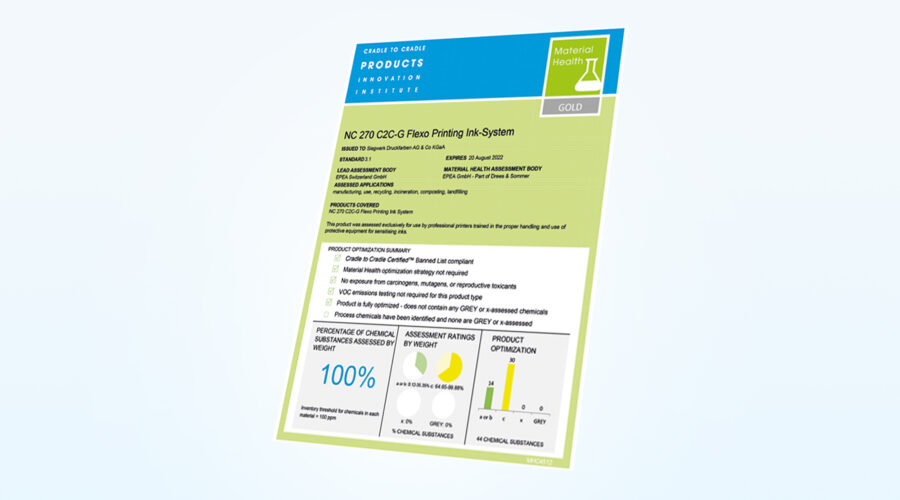
Milestone in the Use of Sustainable Printing Inks
In cooperation with the ink manufacturer Siegwerk Druckfarben AG & Co. KGaA, the EPEA Switzerland GmbH (Environmental Protection Encouragement Agency), and the global packaging and paper company Mondi, Werner & Mertz developed a recyclable printing ink system for flexography which was awarded the Material Health Certification (MHC) GOLD in 2020. With the Material Health Certification, the safety of the solvent-based printing ink NC 270 was confirmed scientifically for biological cycles. Gold certification is awarded exclusively to products that do not pose a danger from carcinogens, mutagens or reproductive toxicants. The flexographic printing ink system can be used to print polyolefin plastic sheeting such as polethylene and polyproplylene.


